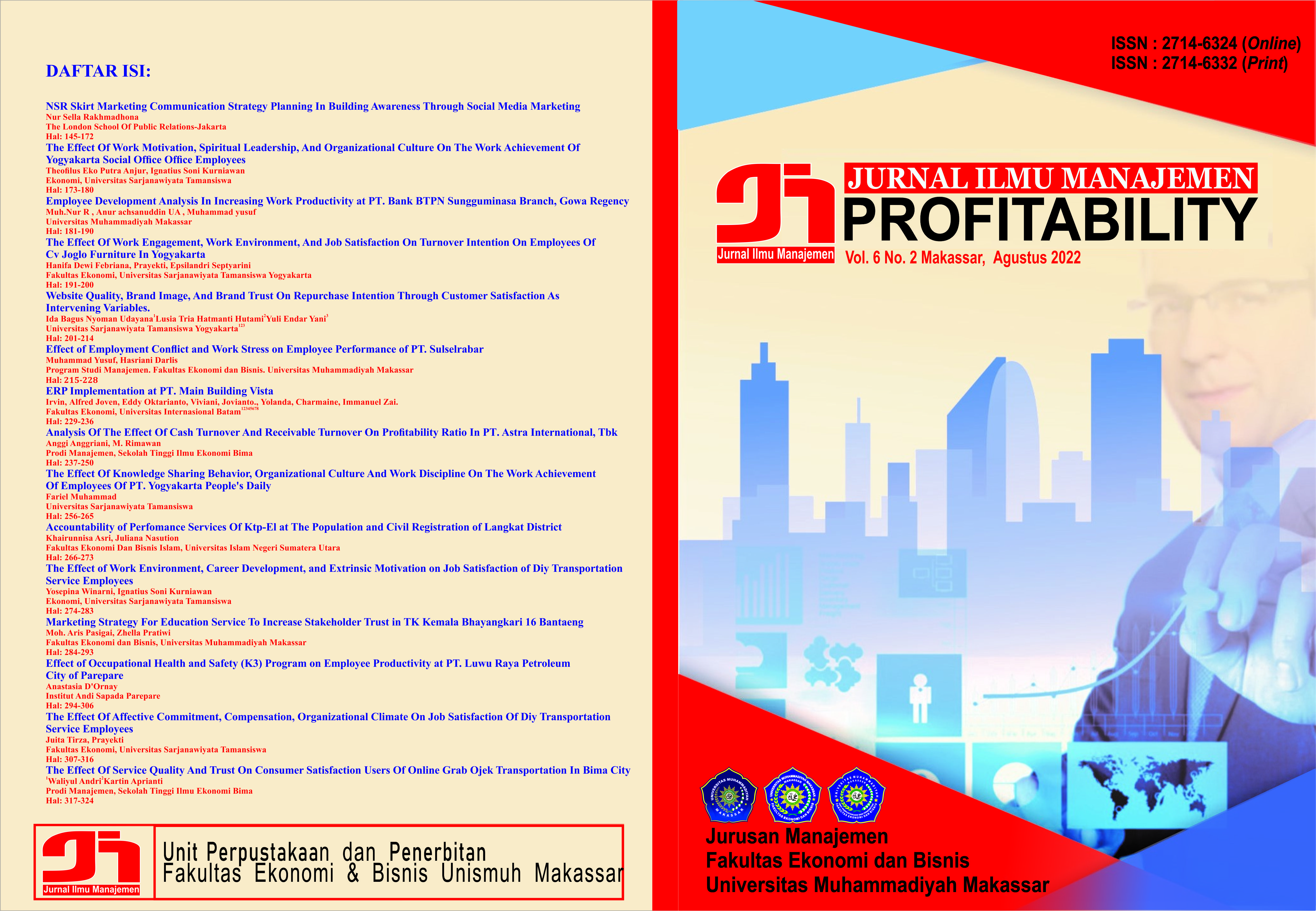ERP Implementation at PT. Main Building Vista
DOI: https://doi.org/10.26618/profitability.v6i2.8476
PT. Vista Bangun Utama, ERP, Enterprise
Abstract
This PT. Vista Bangun Utama is a company that has engaged in construction business since 2009 in Batam City, Riau Islands. In the business process, PT. Vista Bangun Utama does not have any written system for basic operational procedures. This article aims to help PT. Vista Bangun Utama to determine the ERP system that fits the scale of the company. The ERP system Odoo can help PT. Vista Bangun Utama improve the efficiency of the enterprise through database integration such as process purchase, invoicing, expenditure and accountingReferences
Andrianto, A. (2019). Impact of Enterprise Resource Planning (ERP) implementation on user performance: Studies at University of Jember. Journal of Physics: Conference Series, 1211(1). https://doi.org/10.1088/1742-6596/1211/1/012040
Asika, R., & Bonaventure, C. (2020). Effect of Internal Audit Function on Financial Performance of Commercial Banks in Nigeria. | Www.Ijaar.Org Journal International Journal of Advanced Academic Research (Social and Management Sciences) | ISSN, 6(7), 2488–9849. Retrieved from www.ijaar.org
Basheer, M. M., & Watsilla, H. (2010). International Journal of Engineering Technology Research & Management ENTERPRISE RESOURCE PLANNING ( ERP ) SYSTEMS FOR EFFECTIVE ORGANIZATIONAL PERFORMANCE : A CASE OF ERP IMPLEMENTATION AT * Kabir Ismail Umar International Journal of Engineering Technolo. (01), 1–9.
Fan, J. C., & Fang, K. (2006). ERP implementation and information systems success: A test of DeLone and McLean’s model. Portland International Conference on Management of Engineering and Technology, 3(c), 1272–1278. https://doi.org/10.1109/PICMET.2006.296695
Haberli Junior, C., Oliveira, T., Yanaze, M., & Spers, E. E. (2019). Performance, farmer perception, and the routinisation (RO) moderation on ERP post-implementation. Heliyon, 5(6). https://doi.org/10.1016/j.heliyon.2019.e01784
Hindle, T. (2008). Guide to Management Ideas and Gurus. The Economist, 322.
Jenab, K., Staub, S., Moslehpour, S., & Wu, C. (2019). Company performance improvement by quality based intelligent-ERP. Decision Science Letters, 8(2), 151–162. https://doi.org/10.5267/j.dsl.2018.7.003
Jiwasiddi, A., & Mondong, B. (2018). Analysing ERP implementation critical success factors for SME: A study of sap one implementation in Jakarta. Pertanika Journal of Social Sciences and Humanities, 26(T), 139–146.
Kettinger, W. J., Teng, J. T. C., & Guha, S. (1997). Business process change: A study of methodologies, techniques, and tools. MIS Quarterly, (21), 1, 55-80. http://dx.doi.org/10.2307/249742
Klaus, H., Rosemann, M., & Gable, G. (2000). What is ERP? Information Systems Frontiers. Qut, 2(2), 141–162.
Lawrence, P. (1990). Why organizations change, in: A. M. Mohrman et al. (Eds) Large-Scale Organizational. Change, 48–61, San Francisco: Jossey-Bass
Menon, S. (2019). Benefits and Process Improvements for ERP Implementation: Results from an Exploratory Case Study. International Business Research, 12(8), 124. https://doi.org/10.5539/ibr.v12n8p124
Ou, P., Zhao, H., & Zhou, Z. (2018). Does the implementation of erp improve the quality of accounting information? Evidence from chinese a-share listed manufacturing firms. Journal of Applied Business Research, 34(1), 43–54. https://doi.org/10.19030/jabr.v34i1.10090
Putra, D. G., Rahayu, R., & Putri, A. (2021). The Influence of Enterprise Resource Planning (ERP) Implementation System on Company Performance Mediated by Organizational Capabilities. Journal of Accounting and Investment, 22(2), 221–241. https://doi.org/10.18196/jai.v22i2.10196
Talwar, R. (1993). Business Re-engineering Approach. Long Range Planning, 26(6), 22–40.
Downloads
Published
Issue
Section
License
Authors who publish with Jurnal Ilmu Manajemen Profitability agree to the following terms:
Copyright of the articles remains with the authors.
Authors grant the journal the right of first publication with the work simultaneously licensed under a Creative Commons Attribution-NonCommercial 4.0 International License (CC BY-NC 4.0). This license allows others to:
Share (copy and redistribute the material in any medium or format)
Adapt (remix, transform, and build upon the material)
as long as they give appropriate credit to the original author(s) and source, provide a link to the license, and indicate if changes were made. Non-commercial use only.
Authors are permitted to:
Distribute their published work (e.g., post it to an institutional repository or publish it in a book), with an acknowledgment of its initial publication in this journal.
Enter into separate, additional contractual arrangements for the non-exclusive distribution of the journal’s published version of the work (e.g., post it to a class website or institutional archive).
For permissions to use the content published in this journal beyond the scope of the license (e.g., commercial purposes), please contact the editorial office via the journal email.
License Details:
This journal is licensed under a Creative Commons Attribution-NonCommercial 4.0 International License (CC BY-NC 4.0).












